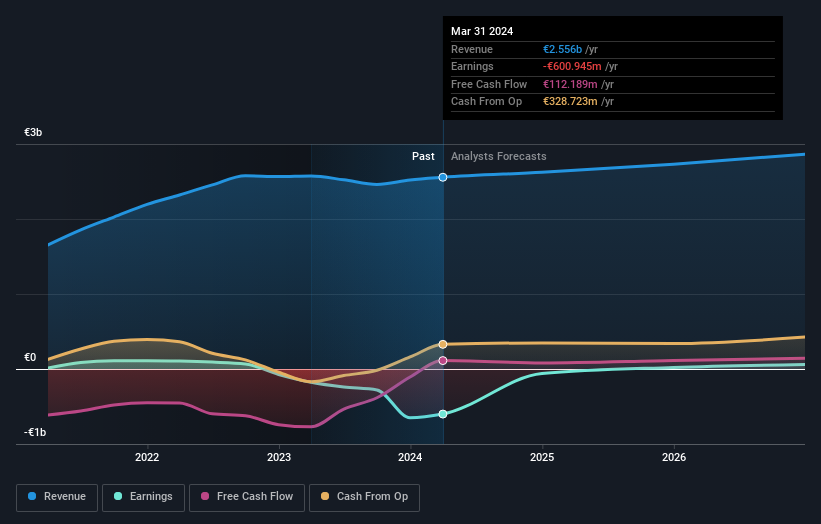Stock Analysis
Private equity firms are Lenzing Aktiengesellschaft's (VIE:LNZ) biggest owners and were rewarded after market cap rose by €160m last week

Key Insights
- The considerable ownership by private equity firms in Lenzing indicates that they collectively have a greater say in management and business strategy
- The largest shareholder of the company is B & C Industrieholding GmbH with a 52% stake
- Institutional ownership in Lenzing is 18%
A look at the shareholders of Lenzing Aktiengesellschaft (VIE:LNZ) can tell us which group is most powerful. And the group that holds the biggest piece of the pie are private equity firms with 52% ownership. Put another way, the group faces the maximum upside potential (or downside risk).
Clearly, private equity firms benefitted the most after the company's market cap rose by €160m last week.
In the chart below, we zoom in on the different ownership groups of Lenzing.
Check out our latest analysis for Lenzing

What Does The Institutional Ownership Tell Us About Lenzing?
Institutions typically measure themselves against a benchmark when reporting to their own investors, so they often become more enthusiastic about a stock once it's included in a major index. We would expect most companies to have some institutions on the register, especially if they are growing.
We can see that Lenzing does have institutional investors; and they hold a good portion of the company's stock. This implies the analysts working for those institutions have looked at the stock and they like it. But just like anyone else, they could be wrong. When multiple institutions own a stock, there's always a risk that they are in a 'crowded trade'. When such a trade goes wrong, multiple parties may compete to sell stock fast. This risk is higher in a company without a history of growth. You can see Lenzing's historic earnings and revenue below, but keep in mind there's always more to the story.

We note that hedge funds don't have a meaningful investment in Lenzing. Looking at our data, we can see that the largest shareholder is B & C Industrieholding GmbH with 52% of shares outstanding. This essentially means that they have extensive influence, if not outright control, over the future of the corporation. Goldman Sachs Group, Investment Banking and Securities Investments is the second largest shareholder owning 7.0% of common stock, and The Vanguard Group, Inc. holds about 1.8% of the company stock.
While it makes sense to study institutional ownership data for a company, it also makes sense to study analyst sentiments to know which way the wind is blowing. There are plenty of analysts covering the stock, so it might be worth seeing what they are forecasting, too.
Insider Ownership Of Lenzing
While the precise definition of an insider can be subjective, almost everyone considers board members to be insiders. Company management run the business, but the CEO will answer to the board, even if he or she is a member of it.
Most consider insider ownership a positive because it can indicate the board is well aligned with other shareholders. However, on some occasions too much power is concentrated within this group.
Our data cannot confirm that board members are holding shares personally. Not all jurisdictions have the same rules around disclosing insider ownership, and it is possible we have missed something, here. So you can click here learn more about the CEO.
General Public Ownership
With a 30% ownership, the general public, mostly comprising of individual investors, have some degree of sway over Lenzing. While this group can't necessarily call the shots, it can certainly have a real influence on how the company is run.
Private Equity Ownership
With an ownership of 52%, private equity firms are in a position to play a role in shaping corporate strategy with a focus on value creation. Some might like this, because private equity are sometimes activists who hold management accountable. But other times, private equity is selling out, having taking the company public.
Next Steps:
I find it very interesting to look at who exactly owns a company. But to truly gain insight, we need to consider other information, too. Case in point: We've spotted 3 warning signs for Lenzing you should be aware of, and 2 of them make us uncomfortable.
If you would prefer discover what analysts are predicting in terms of future growth, do not miss this free report on analyst forecasts.
NB: Figures in this article are calculated using data from the last twelve months, which refer to the 12-month period ending on the last date of the month the financial statement is dated. This may not be consistent with full year annual report figures.
Valuation is complex, but we're helping make it simple.
Find out whether Lenzing is potentially over or undervalued by checking out our comprehensive analysis, which includes fair value estimates, risks and warnings, dividends, insider transactions and financial health.
View the Free AnalysisHave feedback on this article? Concerned about the content? Get in touch with us directly. Alternatively, email editorial-team (at) simplywallst.com.
This article by Simply Wall St is general in nature. We provide commentary based on historical data and analyst forecasts only using an unbiased methodology and our articles are not intended to be financial advice. It does not constitute a recommendation to buy or sell any stock, and does not take account of your objectives, or your financial situation. We aim to bring you long-term focused analysis driven by fundamental data. Note that our analysis may not factor in the latest price-sensitive company announcements or qualitative material. Simply Wall St has no position in any stocks mentioned.
About WBAG:LNZ
Lenzing
Produces and markets wood-based cellulosic fibers for the textile and nonwoven sectors, and industrial applications.
Good value with reasonable growth potential.

